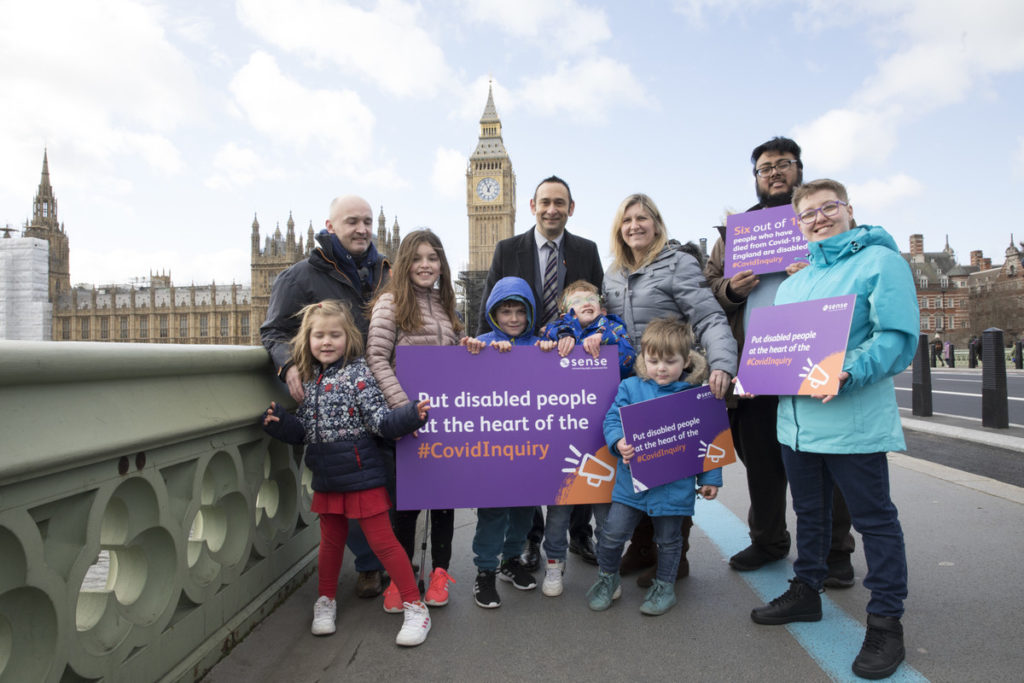How to put disabled people at the heart of the Covid-19 inquiry
Steven, who works in our campaigns team, explains three ways we can put disabled people at the forefront of the Covid-19 inquiry.
Disabled people have been one of the hardest-hit groups of the pandemic. The inquiry is an opportunity to investigate what could have been done better. We’ve been campaigning to put disabled people at the heart of the inquiry. Over 25,000 of you have already signed our petition.
But how can we achieve our goal? Here’s three ways.

1. A key section of the inquiry must investigate the experiences of disabled people
What this means
Disabled people are one of the hardest-hit groups of the pandemic. To really understand what’s happened, the inquiry must investigate the experiences of disabled people. The inquiry should invite disabled people to give evidence.
Why it’s important
Working in the campaigns team at Sense, and as someone who’s disabled myself, I’m often shocked at how little people know about the impact the pandemic has had on disabled people. 6 in 10 people who died from Covid-19 in England in 2020 were disabled. This has been widely underreported, but it speaks volumes.
I don’t believe disabled people’s experiences have been listened to or addressed over the last 18 months. Our research found that three-quarters of disabled people feel that their needs were overlooked during the pandemic.
I’ve seen how disabled people have felt left behind and many are still living with the consequences.
And across society, it often feels that disabled people are not listened to. For years the social care system has needed reform but is repeatedly deprioritised.
Too often, when creating policy, the needs of disabled people are simply not considered. It’s only by hearing directly from disabled people and those with lived experience, that we can really start to move towards a more equal society.
2. The inquiry must be led by a panel that is representative of disabled people
What this means
We want the inquiry to be led by a panel of people that includes disabled people. Often inquiries are led by an individual Chair who has relevant professional skills. But it’s unlikely they would represent the diversity of experiences and challenges that many have faced throughout the pandemic.
Why it’s important
Including disabled people in the inquiry panel will ensure that there is some understanding of the issues that many disabled people have faced. They can make sure that any recommendations take into account the needs of disabled people.
Disabled people make up one-fifth of the population, yet we don’t often see disabled people in positions of authority, whether that’s in business, politics or the media. And while this is improving, we still have a long way to go. It’s estimated that there are just five disabled MPs in parliament.
Until disabled people are among the ones making decisions, we’ll continue to have policies that aren’t inclusive. Disabled people must be included in the inquiry panel so that any findings understand and act on our needs.
3. The inquiry must be accessible
What this means
Disabled people must be able to engage with the inquiry and follow what’s going on. We want to see British Sign Language (BSL) interpreters and subtitles alongside all footage that’s available to watch.
Any written findings or recommendations should be available in alternative formats, like large print. This will support those with sensory impairments and people with learning disabilities.
Why it’s important
Without information about the inquiry being accessible, a proportion of the population won’t be able to engage with it. The experience of many disabled people during the pandemic included being sent shielding letters in fonts that were unreadable. The Government held briefings without BSL interpretation. We can’t let it happen again.
Yet the struggle to get accessible information is not a new one. Accessible information needs to be embedded across society if we want to be truly inclusive. And that starts with government communications and, I believe, the Covid-19 inquiry.
You can help
The Covid-19 inquiry is an opportunity to start to address challenges that have been exposed by the pandemic. But it’s also a chance to start to fix the long-term inequalities that exist across society.
This can only happen if society values disabled people and includes us in a meaningful way.
That’s what we’re calling for in our petition. If you haven’t already, there’s still time to add your name. Together, we can make sure disabled people’s experiences are heard.
Add your name to the petition
It’s time to make sure disabled people are included in the Covid-19 inquiry.

